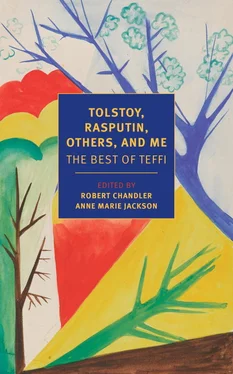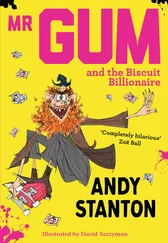Thanks to the countess’s influence, Merezhkovsky was given permission to give a lecture in a public hall. The audience was small, and included several German officers who were clearly there in an official capacity. Merezhkovsky spoke so softly that I could barely hear him, even though I was in the front row. I told him as much during the break.
He took offence. “It doesn’t matter. I refuse to speak more loudly. It’ll spoil my modulations. My modulations are superb. I’ve taken great pains over them.”
In the second half he simply whispered. The Germans got up and left. Recently the countess had grown somewhat less interested in Merezhkovsky. She had more important business to attend to. She was elaborating a plan to save France. It was not the first time she had done this. There had been an earlier occasion when, as she liked to tell us, she had balanced the state budget. How? By arranging greyhound races that had brought the government billions of francs in revenue.
Under the countess’s influence, Merezhkovsky had become more gracious towards the Germans (the devils opposing the Bolsheviks). He had even come to see Hitler as a kind of Napoleon.
“Zinaida Nikolaevna! What is it? What’s got into him?” I asked.
“He’s a sycophant. He’s the son of a minor palace official. That’s why he grovels. First before Piłsudski, then before Mussolini. Pure sycophantism.”
Harsh, but all too true, I fear.
•
Merezhkovsky’s appearance was most peculiar. Small and thin, and in his last years bent completely out of shape. What was remarkable, however, was his face. It was deathly pale, with bright red lips—and when he spoke you saw that his gums were the same bright red. There was something frightening about this. Vampire-like.
He never laughed. Neither of them had the least sense of humour. There was something perverse about Merezhkovsky’s refusal to understand a joke. Sometimes you would deliberately tell them a very funny story just to see their reaction. Utter bewilderment.
“But his answer’s quite wrong,” they would say.
“Yes, and that’s the point of the story. If his answer had been right, I wouldn’t be telling you all this.”
“All right, but why did he answer like that?”
“Because he didn’t understand.”
“Then he’s simply a fool. What’s so interesting about that?”
Nevertheless Zinaida Nikolaevna did appreciate a few lines from a poem by the genuinely witty and talented Don-Aminado.
Look before you leap –
Shoot before you speak.
she would declaim.
Merezhkovsky did not approve.
Zlobin defended Merezhkovsky: “No, he does have a sense of humour. Once he even came up with a play on words.”
More than twenty years of close acquaintance—and a single play on words. Evidently a joker who hid his wit under a bushel.
Zinaida Nikolaevna looked on me with curiosity. To her I was a member of some strange species. She would say, “I absolutely must write about you one day. No one has described you properly yet.”
“It’s too late,” I replied. “I won’t be able to act on your suggestions now, and there’s no changing the opinions of readers. They all made up their minds about me long ago.”
But then a copy of my Witch [6] Witch , a collection of stories with themes drawn from folklore and the supernatural, was published in 1936.
somehow found its way into their hands—and for some reason they both liked it.
“In this volume you’re conspiring with eternity,” said Zinaida Nikolaevna.
“What language!” said Merezhkovsky. “I’m lapping it up, lapping it up!”
Then he added, “You’re nothing like your work. Zina is like her work, but you aren’t. This book is a delight.”
“Heavens!” I exclaimed. “You’re trying to tell me that I’m an abomination. How awful. But I don’t think there’s much we can do about it now.”
“But why do you give so much space in your work to the comical? I don’t much care for the comical,” Merezhkovsky once said to me.
Not “humour”, but “the comical”. Probably his way of showing contempt.
I reminded him of Gogol’s words about humour.
“Listen: ‘Laughter is deeper and more significant than people think. At its bottom lies an eternally pulsating spring which lends greater depth to any subject. Even he who fears nothing else on earth fears mockery. Yet there are some who are unaware of laughter’s remarkable power. Many say that humour is base; only when something is pronounced in stern, laboured tones do they acknowledge it as sublime.’” [7] From Gogol’s “A Theatrical Journey” (“ Teatralny razezd ”), written in response to critics of his play The Government Inspector .
Merezhkovsky was terribly offended: “My tones aren’t in the least laboured.”
“Of course they aren’t. Everyone knows about your modulations. This wasn’t written about you.”
•
Zinaida Nikolaevna often quoted from her own poems. Merezhkovsky did not like her recent work.
“Zina, these are not poems.”
“Yes, they are,” she insisted.
“No, they’re not,” he shouted.
I intervened: “I think I can reconcile you. Of course they’re poems. They have metre and rhyme—all the formal elements of verse. But they’re verse rather than poetry, prose thoughts in verse form.”
They both accepted this. Now that they had read Witch , I was no longer she but Teffi.
•
I remember falling ill and spending nearly a month in bed. The Merezhkovskys visited regularly, and once, to the astonishment of everyone in the room, Dmitry Sergeyevich brought a paper cornet of cherries. He had bought them along the way. We all exchanged glances, our faces all saying the same thing: “And there we were, thinking he has no heart.”
Merezhkovsky asked sternly for a dish and said the cherries should be washed.
“Dmitry Sergeyevich,” I said sweetly. “It’s all right, I’m not frightened. There’s no cholera now.”
“I know,” he said grimly. “But I’m still frightened.”
He sat in the corner and, noisily spitting out the stones, ate every last cherry. It was so funny that those present were afraid to look at one another lest they burst out laughing.
•
I was preoccupied by this strange man for a long time. I kept looking for something in him and not finding it. I remembered “Sakya Muni”, Merezhkovsky’s poem about how the Buddha, the Sage of the Shakhya clan, [8] Teffi is referring to Merezhkovsky’s early poem “Sakya Muni” (1885), in which a poor thief berates the Buddha for preventing him from stealing one of the Buddha’s gems: the Buddha is immortal and has no need of gems—so why should he deny a mortal thief a way to earn his crust of bread?
moved by the suffering of a lowly thief who had said to him “Lord of the World, you are wrong”, had bowed his crowned head to the ground. This hymn to humility—from the pen of Merezhkovsky!
And then, one day not long before his death, after they had returned to Paris disappointed by their German patrons and with no money at all—they had even had to sell a gold pen some Italian writers had presented to them during Merezhkovsky’s Mussolini period [9] Throughout his émigré years Merezhkovsky had been hoping to find a strong ruler who could save Europe from Bolshevism. At one time he had placed his hopes in Mussolini, who had sponsored his book about Dante (1939). Merezhkovsky met Mussolini several times. In one of his letters to him he wrote, “The best, the truest and the liveliest document on Dante is—your personality. […] Visualize Mussolini in contemplation, and it’s Dante. Imagine Dante in action, and it’s Mussolini” (Vadim Polonsky, “Merezhkovsky, Dmitry Sergeyevich”, www.krugosvet.ru .; retrieved 2nd February 2010).
—the three of us were sitting together and Zinaida Nikolaevna remarked of someone, “Yes, people really do love him.”
Читать дальше












